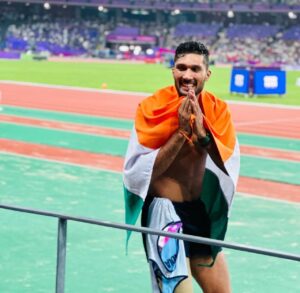
With World Mental Health Day, October 10, around the corner, it was pertinent to speak to an athlete who was one of India’s great success stories from the Asian Games, after having grappled with mental health challenges. And yet, that ordeal is hardly documented, and we haven’t ever asked this question – if he wasn’t successful, would we have spoken about Tejaswin Shankar, India’s best high jumper and decathlete?
Tejaswin is an atypical sportsperson. He is extremely articulate, worked for Deloitte in the US, is happy to experiment and fail, and is living life on his terms. In this conversation, he opened up on issues relating to mental health and much more.
Boria: Tejaswin, you are now a success story. But until five days before the Commonwealth Games last year, you weren’t sure if you were going to Birmingham. What does such uncertainty do to an athlete?
Tejaswin: I don’t want to sugarcoat it, and so I will say this to you – it wasn’t easy. I was finding it very hard. Anyone will. Ahead of a mega event, athletes focus on the event, and how to perform. Yet, in my case, I was wondering if I was going to Birmingham at all. One day, I was going, and the next day, I wasn’t going. Trust me, it wasn’t easy in any way. Now, when I look back and the story has a happy ending, it all seems fine. But at the time, it was a very difficult period for me.
Boria: So, how did you deal with it? It was difficult for sure, and in mental health terms, it can have a lasting impact on an athlete.
Tejaswin: Yes, it can. I remember on July 25, 2022, just three days before the Commonwealth Games started, it was my grandmother’s birthday. In normal circumstances, we would all have been happy celebrating her 84th. Not so that day. This is all the more so because we are a close-knit family. On that day, when she saw me, she was unhappy. She could sense I was tense and said something like: ‘This shouldn’t happen to anyone.’ Like I just said to you, it was hugely challenging. How do you deal with such uncertainty that’s not even in your hands? How can you rein in your mind in such a situation?
Boria: And then to go on and win a medal, it was quite something.
Tejaswin: Again, if I tell you that winning a medal was on my mind in Birmingham when I went into the stadium, I would be lying. All I was saying to myself was that I shouldn’t make a fool of myself. This was my biggest opportunity and I just had to put on a show. I couldn’t fail, for if I did, you can imagine what I would have been subjected to back home. Now, that’s the most difficult thing for an athlete. I wasn’t happy while competing. Never did I think of adding to the team’s medal tally. It was all about doing something respectable. And when it finally happened, and I won the bronze, it was something unbelievable. I can’t actually express to you what I was going through.
Boria: You won the bronze on countback – can you recount the moment for me and what was going on in your mind?
Tejaswin: I am not one of those people who wishes negative [things] for an opponent. Never have I done so. The Commonwealth Games was perhaps the one time where I was praying that Donald [Thomas] failed the 2.25m and I got the bronze. I was literally praying. And when it happened, it was joy and relief all merged into one. That I hadn’t failed was the most important thing for me.
Boria: Since coming back, you have been much celebrated. Now more so with the Asian Games medal. Interestingly, you even tried a corporate job.
Tejaswin: Glad you asked this question. When I decided to take up the job, a lot of my friends asked me the ‘Why’ question. Even my coach said I should perhaps concentrate on a full-time sports career. My mother too was curious about my choice. But you know what, I am one of those people who will inevitably do the thing that others feel can’t be done. I am not saying I will be successful every time. All I am saying is that I will definitely try. I want to try and then fail, and not just give up without trying. The job was one such. Few have tried this model. And if I am successful, I am sure there will be many in the future who will do this. As a result, for me, it wasn’t a hard choice. I wanted to take up the challenge.
Boria: Interesting you say that, because unless you try to break the rule, how do you know there are other ways to succeed? And sport teaches us that it’s okay to fail. Not everything has to have a happy ending. We are human. We can and will fail.
Tejaswin: Absolutely. And the index of success is also very different for different people. For some, it will be medals at every stage of their sporting career. For me, that’s not the case. I am happy to have a better balance in my life. There is so much more than sport. I love competing, love doing what I do and want to live life on my terms, and also fail on my terms. That’s all I can say really!




